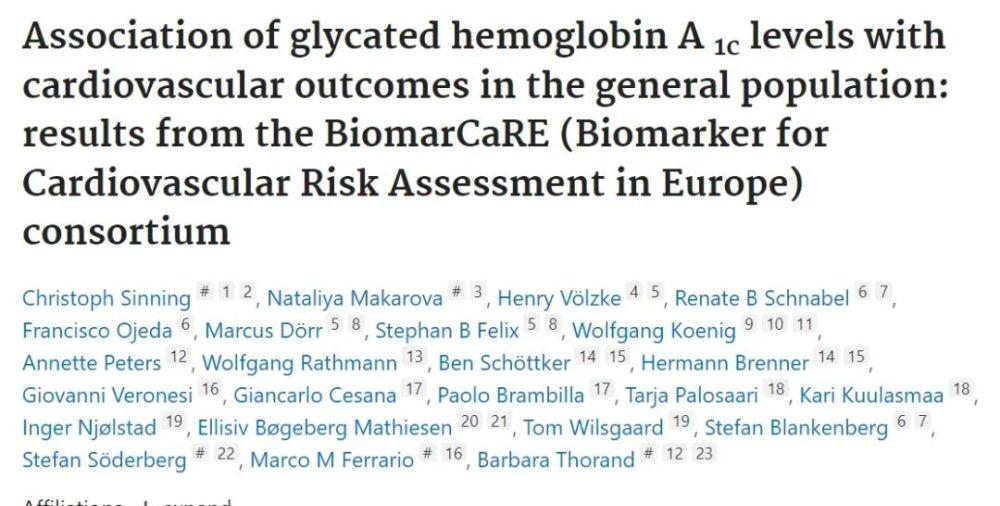Glycosylated hemoglobin (HbA1) is not unfamiliar to diabetic patients, whether it is the diagnosis of diabetes or the evaluation of treatment effects, it is inseparable from this indicator.
Glycosylated hemoglobin is a non-enzymatic catalyzed reaction of the hemoglobin in red blood cells with glucose or other sugars, which is continuous and irreversible. Normal human RBC lifespan is 120 days, so glycosylated hemoglobin concentrations reflect average blood glucose levels over the past 8 to 12 weeks.
Glycosylated hemoglobin is composed of HbA1a, HbA1b, HbA1c, of which HbA1c accounts for about 70%, and the structure is stable, and the clinical detection of glycosylated hemoglobin is HbA1c. The normal range of HbA1c is 4%-6%, and the normal value of different detection instruments is slightly different.
Previous studies have shown that in diabetic populations, HbA1c is positively correlated with the risk of diabetic death, microvascular complications, and myocardial infarction, so in non-diabetic people and HbA1c is in the normal range, is HbA1c associated with the incidence and mortality of cardiovascular disease?
At present, cardiovascular risk assessment for the general population mainly relies on traditional cardiovascular risk factors, including blood lipids, blood pressure, sex, age, diabetes, smoking, etc.
Diabetes, as a classic risk factor for cardiovascular disease, in order to find new markers in the clinic that can predict cardiovascular risk, glycosylated hemoglobin (HbA1c) is considered a potential candidate by researchers. Although an association between HbA1c levels and cardiovascular risk or all-cause mortality has been reported, there have been fewer studies in non-diabetic populations where HbA1c levels are associated with cardiovascular risk and prognosis.
Related research
A study of HbA1c and cardiovascular outcomes published in November 2021 in the journal Cardiovascular Diabetology further showed that HbA1c was associated with cardiovascular outcomes in non-diabetic populations, emphasizing the importance of HbA1c in the population as a whole.

Investigators included data from six prospective cohort studies from four European countries (Germany, Italy, Sweden and Norway) with a total sample size of 36,180 people, with 32,496 participants having diabetes at baseline and 3,684 participants without diabetes. Each cohort collected glycosylated hemoglobin levels and traditional cardiovascular risk factors at baseline. Study endpoints included cardiovascular death, all-cause death, and cardiovascular disease (including first fatal or non-fatal coronary event, ischemic stroke).
The longest follow-up period was 21.9 years, and the median follow-up time was 9.9 years, during which 1392 cardiovascular deaths, 2711 cases of cardiovascular disease, and 4601 all-cause deaths were observed.
According to the glycosylated hemoglobin level, the researchers divided the study population into three groups, HbA1c1c: 34.4-38.8mmolmol/mol (5.3%-5.7%), HbA1c>38.8mmolmol (5.7%). The results of K-M analysis showed that with the increase of HbA1c levels, the incidence of cardiovascular disease, cardiovascular death and all-cause death was higher.
The results of COX regression analysis showed that HbA1c levels correlated with the incidence of three endpoint events after correcting for traditional cardiovascular risk factors such as age, sex, lipids, and smoking. For every 10 mmol/mol (about 3%) increase in HbA1c, the risk of cardiovascular death, cardiovascular events, and all-cause deaths increased by 16%, 13%, and 9%, respectively. The results of subgroup analysis showed that in non-diabetic populations, the risk of cardiovascular events and all-cause death increased by 12% and 10%, respectively, for every 10 mmol/mol (about 3%) increase in HbA1c. In addition, after subgrouping by age, the analysis found that the association of HbA1c with cardiovascular disease risk was more pronounced in people younger than 55 years of age, but this correlation gradually weakened with age.
To verify the dose-response relationship between HbA1c and the three study endpoints, the authors plotted restriction splines for the three endpoint events, and the results showed that in addition to cardiovascular death, glycosylated hemoglobin levels were monotonically increasing with cardiovascular events and all-cause deaths. Finally, in order to prove whether the addition of HbA1c to a model containing traditional cardiovascular risk factors can improve the predictive efficacy, the researchers also made model predictions.
summary:
HbA1c was independently associated with cardiovascular mortality, all-cause death, and cardiovascular disease in the general population, with dose-response relationships at both endpoints of cardiovascular disease and all-cause death. In non-diabetic participants, elevated HbA1c levels increased the risk of cardiovascular disease and all-cause death. Therefore, screening for HbA1c levels may be considered in non-diabetic populations when assessing cardiovascular risk.
【Reference】
1.Sinning C, Makarova N, V lzke H, et al. Association of glycated hemoglobin A(1c) levels with cardiovascular outcomes in the general population: results from the BiomarCaRE (Biomarker for Cardiovascular Risk Assessment in Europe) consortium. Cardiovasc Diabetol. Nov 15 2021;20(1):223.
2.Selvin E, Steffes MW, Zhu H, et al. Glycated hemoglobin, diabetes, and cardiovascular risk in nondiabetic adults. N Engl J Med. Mar 4 2010;362(9):800-811.
3.Khaw KT, Wareham N, Luben R, et al. Glycated haemoglobin, diabetes, and mortality in men in Norfolk cohort of european prospective investigation of cancer and nutrition (EPIC-Norfolk). Bmj. Jan 6 2001;322(7277):15-18.
Source: Shuangyashan Research Small Black House
Editor: Ren Mileage Reviewer: Xiao Ran